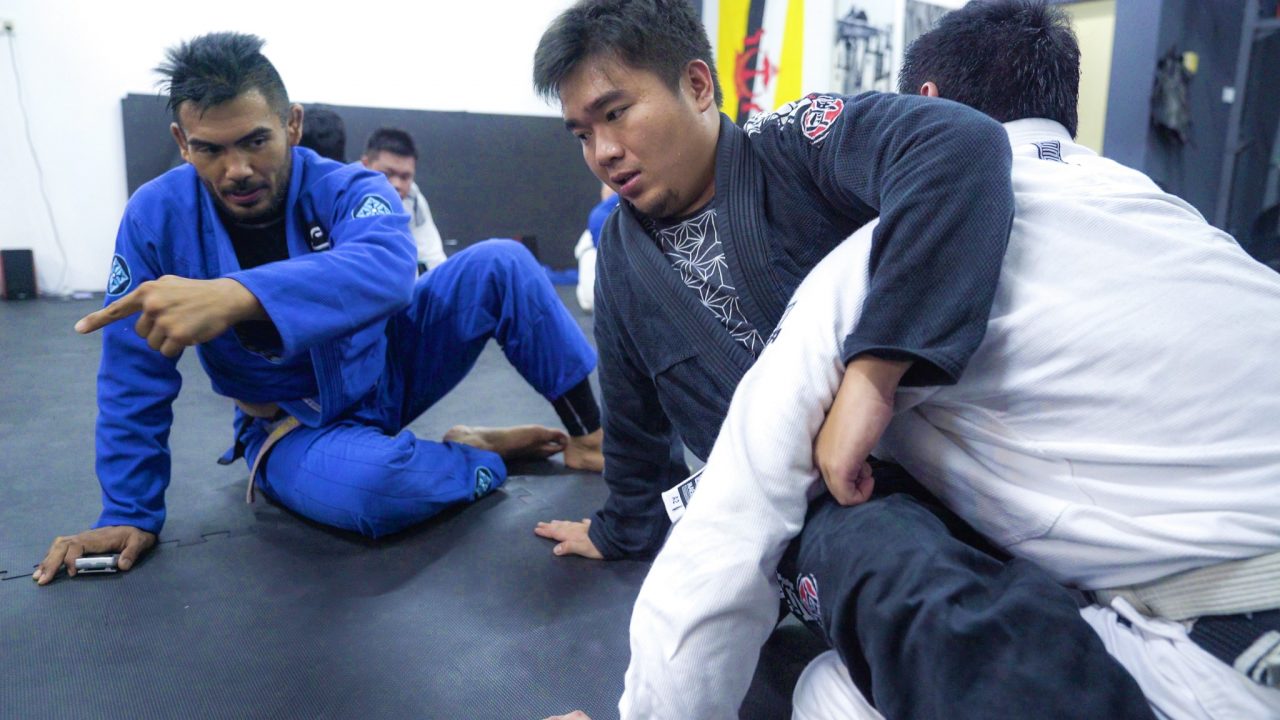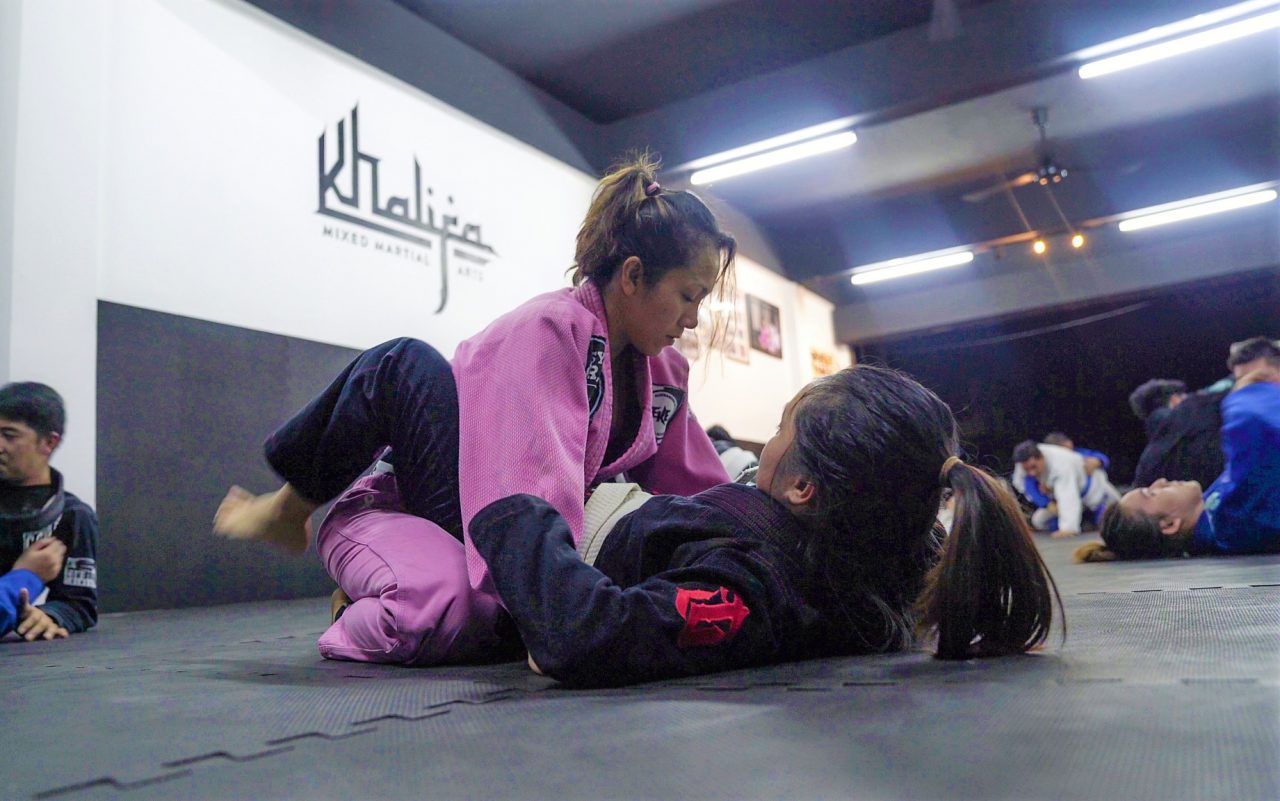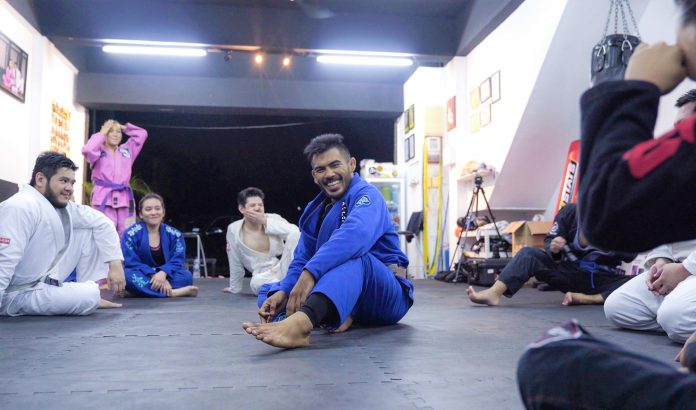The first flight of stairs at Tasek Lama are the first hurdle attempted by thousands – from the young to the elderly – looking to get in better shape.
Ahmed Faez Anuar, an obese student of architecture in his early 20s, was here to battle his obesity. Out of breath and dizzy after the first ascent, ‘Eazy’ as he’s affectionately called by family and friends, had to be escorted down.
He later tipped the scales at over 120 kilograms during a medical check-up, and doctors warned Eazy that his blood pressure, sugar levels, and cholesterol were at worrying levels.
Flash forward to two Sundays ago, with the raucous noise of the crowd behind him, Eazy begins to wrap his hands.
It’s the first amateur boxing competition the Sultanate has seen in a long, long time, and Eazy – now 32-years-old – has made it to the finals.
He remains quiet and focused as he begins shadow boxing to warm up. No grunting, posturing or chest thumping as he steps up to the ring.
Weighing in at a lean, muscled 81 kg, Eazy appears calm and collected, but under the hall’s tired lighting, is ready to fight ATIM Boxing’s Kevin Lim Chee Chong.
His wife, Norfaziah Abas, appears slightly anxious. Members of his gym, Khalifa Mixed Martial Arts (MMA), look on intently.
With a spring in his step, Eazy unleashes – and connects – with a barrage of punches. Into the second round, the referee stops the fight.
Eazy has forced all his fights at the Pahlawan Competition into retirement. He is now is the light heavyweight champion.
Pioneering grappler
In the final row of commercial blocks in Kiarong, Eazy, along with his wife and cousin Adi Azmi Sharbini, are setting up their first martial arts gym. Their signboard has yet to be installed, but on a Wednesday evening, Khalifa MMA is already operating at full capacity.
About 20 students are here to learn Brazilian Jiu-Jitsu (BJJ) – a form of grappling or ground fighting, that to the uneducated eye, may be generalized to be some form of wrestling.
While Eazy may have just won a boxing title, a frame that hangs on the gym’s walls, holding dozens of BJJ medals, hints that his true home is on the mat.
“It might be cliched to say, but BJJ changed my life,” says Eazy. While still a fringe martial arts to the general public, BJJ is very much experiencing a radical upsurge in popularity, in tandem with the growth of MMA.
In the first few Ultimate Fighting Championship (UFC) events, a slender Brazilian Royce Gracie – whose family pioneered BJJ from elements from Japanese Judo – emerged champion, shocking both spectators and his opponents, sometimes a hundred pounds heavier, by submitting them with joint locks and chokes.

In an MMA fight, or even in a street fight, the odds for the altercation to go to ground, are high.
“The Gracies really proved the effectiveness of BJJ in a real fight,” said Eazy. “It wasn’t just a fancy set of moves on boards or bags. It was brutally effective.”
By 2009, Eazy had gotten in health back on track. The steps of Tasek had become a breeze, and he fell for his “first love” in sports: Rugby.
Serving as the national team’s captain for more than five years, Eazy was always on the lookout for more physical training; he also picked up boxing in the off-season and on one fateful evening, dropped by the RBA complex, on the recommendation of a friend, for a small BJJ session hosted by David, a New Zealand expatriate who worked as a CFBT teacher.
“My wife was part of the class,” says Eazy with a smile. “I was hooked immediately. The physicality, the new challenge. BJJ was like this insider thing that nobody trained or really knew about yet.”
Student; teacher
Eazy had been training two years and was still a white belt – the most junior rank, when David, then a blue belt, a rank above white, stopped classes due to other commitments.
“I couldn’t bear the thought of BJJ just stopping there,” said Eazy, who then introduced himself to Alwee, the owner of Busiido, a new martial gym opening at BT Complex near Times Square.
“I had to step up or I feared BJJ would just be forgotten. I told him (Alwee) that I needed a training space and would conduct classes there. There was a handful of us only in each class at the start, maybe three or four.”
At Busiido, Eazy built Brunei’s BJJ scene to close to 100 members, and in the process graduated from white to brown belt, embracing the duality of the roles he was forced to take on for BJJ to survive in the Sultanate – he was both student and teacher, coach and competitor, a leader but also a follower.

His holidays became “train-cations” he jokes, where he trained and competed in BJJ while networking to later bring visiting black belts to Busiido – all while balancing his full-time duties as a civil servant.
Over the years, however, Eazy and Alwee would begin to disagree on where the gym was heading, and in October 2017, Eazy decided that Brunei BJJ classes would no longer be held at Busiido.
“Unfortunately things came to point where we couldn’t agree on where the sport was heading,” says Eazy, who chooses not to speak elaborately over the fallout. “We felt that BJJ and MMA were becoming less of a priority.”
A new beginning
There are no fancy machines, trampolines or Zumba classes at Khalifa MMA. Aside from a squat rack, some weights, and punching bags, the space is primarily an open mat where combat drills are to be honed, and news skills to be applied during sparring.
Some may consider Khalifa as a purist MMA gym, where all that is done and is on offer, is in service of getting better at the different disciplines of martial arts.
But that’s not to say that the gym is exclusive – in fact, it’s the opposite, holding classes for kids, teens, and beginners as well as sessions for those looking to seriously compete in MMA.
“We’re dedicated to providing a clean, positive and welcoming environment where people – from beginner to advanced – can train to get better,” said Eazy. “We see this as a starting point to put Brunei on the map for martial arts.”

Walk-in rates for classes are $10 and last 60 to 90 minutes, with monthly packages to be announced at the end of this month. Spots for personal training are also open.[/caption]
The 32-year-old is open about his desire to pursue coaching – and running the business – full-time. Until then, Eazy will rise early, working 7.45am to 4.30pm, before heading to Khalifa past 5pm, and remain to conduct classes until 10pm.
That Wednesday when I came to visit had been particularly grueling, Eazy had been on the mat for hours to teach drills and then spars alongside his students. As the clock strikes 10, the session ends, and the members huddle together to socialize as Eazy takes a water break.
“Kalifah means to be (entrusted) to something great,” says Eazy. “And that’s what we believe we have the privilege of doing. My wife, Adi and I, we see it as our duty to carry it (martial arts) forward.”
As I leave the gym, I hear a large, repetitive thump. Turning back, I see Eazy in the background, beginning his strength and conditioning session, striking a sledgehammer onto a giant tyre.
Khalifa hosts classes every day and is located at Unit 10, Ground Floor, Bangunan Arafah, Spg 41-1-8, Jalan Kiarong, Kg Kiulap, BE1318. Follow @khalifamixedmartialarts on Instagram and Facebook to learn more and contact +6738110303 or +6737222633 to get in touch directly.












